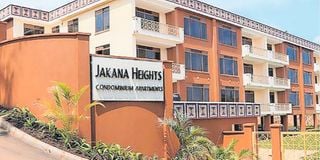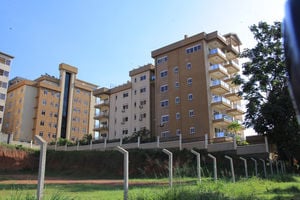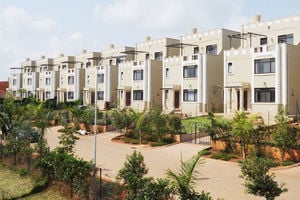
The high cost of condominiums, is often attributed to the factor that makes it a tempting choice; location with stunning views and close proximity to essential services. PHOTOS/STEPHEN OTAGE.
It is clear that bigger homes usually cost more than smaller ones, assuming other factors are the same. Single-family homes, being larger, generally have higher prices than condominiums. However, when comparing homes and condos, the situation gets more complicated. Condos are often built in areas where land is more expensive, so their price per square foot can be higher, even though they might be smaller.
The average cost of a three-bedroom bungalow in a Ugandan city suburb can vary depending on the specific location and other factors such as the condition of the property, amenities, and neighbourhood.
However, the cost ranges between Shs80m and Shs200m while in other cities such as Entebbe, Jinja, or Mbarara, prices range between Shs60m and Shs150m. This amount can only get you either a two or one-bedroom condo. What could explain this difference in prices?
What do buyers pay for? Convenience
Ronald Atwine, a civil engineer and MD at SandBolt Limited notes that condos are typically favoured by urban residents, who appreciate a certain level of conveniences such as living close to their workplaces, entertainment, modern amenities such as gyms, swimming pools, and 24/7 security.
“Condos are for the young professionals who value a low-maintenance lifestyle. A majority of condos offer maintenance and services and even housekeeping that are not available with stand-alone,” he says.
Reagan Peter Nkusi, director of sales and marketing at Jakana Limited, explains that condominiums offer convenience for business people who frequently travel internationally. They can leave their property with the assurance that it will be well maintained in their absence.
"Shared amenities, such as swimming pools and gyms, become more affordable because the costs are distributed among all the owners. Additionally, there is less general maintenance required per unit, resulting in smaller utility bills and lower annual costs. This allows you to afford a much more luxurious property for the same price as a standalone house," he observes.
Quality construction
Another reason for the apparently high prices is the elevated construction costs. "During the pre-construction phase, pricing is significantly affected by government taxes, regulations, development charges, and increasing construction expenses. Builders are working with narrow profit margins, yet the prices remain high," explains Nkusi.
Nkusi also points out that typical condo owners often have very high expectations due to their exposure to quality housing in markets such as Europe, Asia, or America.
"That is why we prioritise construction quality. As international developers, we adhere to the same standards and use the same high-quality materials as we do for projects in the UK or Europe. We use top-tier materials, including marble kitchen counters, imported tiles, and kitchen fittings from Europe, which all contribute to the overall cost," he explains.
According to 2020 data from Centre for Affordable Housing Africa, Uganda ranks high on the global chats of most expensive construction materials.
“Comparing the cost of a standard 55m2 house in Kampala against major cities in five African countries, the cost benchmarking shows that Kampala has the third-highest construction cost after Pretoria, South Africa and Lagos, Nigeria. Building the standard house in Kampala is 46 percent more expensive than in Pretoria. When comparing the costs of different housing typologies (smaller detached houses and medium and higher-rise units), multi-storey typologies increase average construction costs (with higher buildings requiring higher-specification construction and fittings such as elevators and emergency exits,” the report states.
In addition to material costs, high labour expenses also drive up the overall cost of condo units. “Currently, a porter costs Shs20,000 per day, while a mason costs Shs40,000 per day. This is double the rate from about three years ago,” says Atwiine.
Investment
We have seen a growth in purchase of condos for both owners to live in and for investment. However, there have been complaints about size. Bob Bwayo, a real estate agent with more than 20 years in the field, says many clients complain that developers are not building enough family-sized condo units to keep up with the future needs of home buyers.
“I do not have many three-bedroom sales simply because their price tag is out of range for most of my clients. I have had clients choose to go for three-bedroom standalone house after failing to buy similar sized condos. They are able to get a house that usually has a yard and an extra parking spot, which offer more value for families,” says Bwayo.
Why are condos more expensive than houses?
To answer why condos are expensive, it is important to understand that the primary driver of new construction is investor demand rather than demand from families.
Investors are willing to pay significantly more for condos than end users, and they tend to prefer smaller units. These smaller units are less expensive to build and often offer a better return on investment.
Consequently, developers base the price of land on what investors are prepared to pay for condos, making it challenging to build affordable family-sized units.
For end users, condos address a specific market need. If you want to live in the heart of the city, a condo is often your only option, especially if you lack the patience or budget to buy or construct a home of your own.
Atwiine compares building a home to cooking a meal from scratch: "Building is like preparing a homemade meal you must go through all the steps yourself, unlike ordering a ready-made meal from a restaurant. If you have Shs150m to invest, you are better off purchasing a one-bedroom condo, as this amount may not cover all the costs involved in construction."

Some developers invest in superior construction materials that discerning
consumers are willing to pay handsomely for.
When it comes to buying a property, location remains crucial. However, sometimes it is wiser to buy a house slightly further from your preferred area rather than opting for a more readily available high-rise condo.
"As cities expand and populations grow, places currently considered 'far' will become more desirable. For instance, when people say Nsangi is far, I question what they’re comparing it to. When evaluating a property's location, potential resale value should be a key consideration. If you have the means, now is the best time to invest, as these areas will become increasingly unaffordable in the future," Atwiine advises.
Atwine notes the high cost of condominiums, is often attributed to the factor that makes it a tempting choice; location. This, however, he feels should not be such a major consideration in the new normal.
“The restructuring of work has made it possible to work without needing to live close to your workplace. Additionally, companies are moving out of the central business district (CBD) and into the suburbs, showing that this trend is dynamic and ongoing. Areas such as Kiwenda, once remote villages, are now being developed. Those who buy and build homes in these emerging areas are likely to benefit significantly when Wakiso becomes a city. Therefore, the appeal of a specific location should not be a major consideration if one takes into account factors beyond current trends,” Atwine notes.
What does the future hold for condominiums in Uganda?
Nkusi predicts that condos are not about to go away, they instead are expected to gain even more popularity as they provide a crucial solution for the growing populations of Kampala and other major cities in Uganda.
With limited space available for standalone houses within city centres, condos offer a practical alternative for residents who want to live within easy commuting distance of the city. As a result, standalone houses will increasingly be constructed on the outskirts and beyond city boundaries.
The industry has faced challenges with poor-quality finishes, such as substandard plumbing and electrical work, inadequate tile installations, and weak retaining walls.
However, new developers entering the market are committed to delivering high-quality housing.
“This shift towards better standards will likely encourage other developers to improve their own practices once they see that consumers are willing to pay a premium for quality,” Nkusi predicts.
Financing options
Financing has been holding back the growth of the Ugandan residential property market for many years, despite the high demand for housing and an increasing percentage of the population ready to become a home owner.
Unfortunately, the traditional way Ugandan property financing works means only a very mall proportion of buyers are eligible for a Ugandan bank mortgage.
But today, many experienced developers are turning the system on its head and providing an innovative solution for those ready to be homeowners.
However, the majority of people looking to buy a house and who are capable of meeting their repayment obligations do not have traditional documented regular pay slips. But they are in a financial position to buy their home.
To address this issue, some developers are now offering a finance plan as part of the purchase arrangement. These finance plans are normally open to those willing to buy off-plan during the construction period when the developer can offer more advantageous deals to early buyers.
Clive Kefford, the CEO of ProAfco, a seasoned Ugandan property developer , notes that: “Every country is very different in terms of the type of property purchased and way of purchasing them. Uganda is similar to Britain in that most people dream of owning their own properties, which is not true in a lot of Europe, where long term renting is more popular. As buying is very expensive for most people in all countries, it is only possible if the financial services are available to facilitate it. In the UK, it is possible to borrow 100 percent of a property’s cost and borrowing 90 percent is common. In Uganda this is not easy and high interests make buying unaffordable for a large sector of the population reducing the proportion of people who can buy,” notes Kefford.
He suggests that the government should focus on assisting first-time homebuyers with their deposits for pre-construction homes.
FINANCING
Clive Kefford, the CEO of ProAfco, a seasoned Ugandan property developer explains that; “addressing the restrictions on Ugandan banks to provide appropriate finance plans that match the average Ugandan’s needs is critical to stimulate the residential property market and this requires a different way of financing.”
ProAfco offers clients financing for their properties with loans of up to 10 years to anyone who can demonstrate financial security and the ability to pay.
“The initiative is faster and less expensive because for example, it is not necessary for developers to make independent checks on the value of their property to provide the security required by the banks. The developer already knows its value and can therefore plan finances accordingly without paying a third party to do an assessment,” says Kefford








